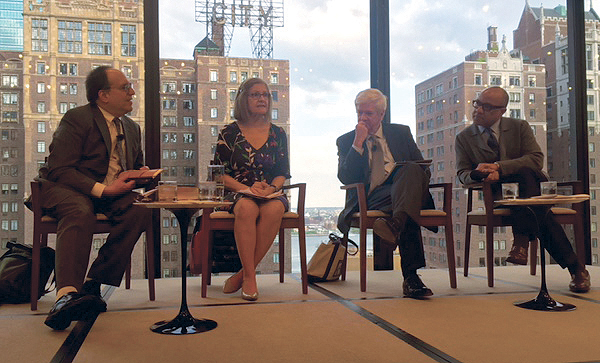NEWSLETTER
|
Remembrances of Richard Magat
From his friends at the Rockefeller Archive Center
In preparation for the exhilarating 25th anniversary celebrations last spring, Dick insisted that the RAC had copies of all the newsletters. He could not believe that they were not part of the Ford Foundation collection. But, of course, they couldn’t be, given the Society’s origin.
Happily, Ford Foundation Archivist and Librarian Alan Divack remembered exactly where the boxes with the newsletters and other papers had been. With the expert detective skills of Ford Records and Archives Manager Andrea Donohue and LAFF Secretary-Treasurer Nellie Toma, the missing files eventually were located and transferred to the Archive Center as their own separate collection.
To provide Dick with the means to write his reminiscences in time for the celebration, one of us made copies of all the newsletters for him. In doing so, we realized the wealth of knowledge embedded in each newsletter: about board programs, about Ford staff members and grantees, and about world and national events.
As the longtime head of Ford’s Office of Reports, Dick’s insistence on reviewing the full history of LAFF brought forth his memorable talk and article for the anniversary celebration. It also built a bridge connecting those who create the history of the Ford Foundation with those who preserve and make it accessible to scholars and other practitioners.
It was Dick’s longtime friend (and sometimes tennis adversary) Jim Smith, RAC Vice President, who first invited Dick to meet with RAC staff. Dick led a lively discussion about the Ford Foundation and its thousands of boxes and tapes. Now, thanks in large measure to Dick, the LAFF Society material will augment that Collection.
Dick’s sense of fun comes through in the photos in this newsletter. However, he was all seriousness when it came to philanthropy, history and making the right decisions. One of us, Pat Rosenfield, had interacted with Dick over the years when she was at Carnegie Corporation, most notably when she was running the Carnegie Scholars Program. Dick was a constant caller about the importance of funding independent scholars. That is, Dick argued that some of the best scholarship was not being conducted in a university or think tank but, rather, by individuals working independently and not beholden to any institutional policy or ethos.
While always dedicated to the Ford Foundation and the other institutions where he worked, Dick cherished the value of independence and the freedom to question accepted doctrine.
Pat recalls that Dick never wasted time to make his case. No flattery or flowery openings for him. The phone would ring and he would ask, “Have you contacted that group of independent scholars? Who will be written to? Who has been nominated? What is taking you so long to respond?” It was such a relief when she could tell him that there were at least a couple independent scholars–without institutional affiliations—on the roster and then, at last, one was funded. Dick’s powers of persuasion ensured a few more such awards over the years.
That same determination to ensure that all aspects of a story would be told—the successes and failures, the right turns and the wrong ones, those that should have been funded and sustained and those that should not have been—infuse his invaluable 1979 book, The Ford Foundation at Work. His discussions of planning and evaluation, indeed his grasp of the knowledge of decision-making from the perspective of practice and scholarship, comprise important lessons for the philanthropic sector. It should be on every program officer’s desk, and not only at the Ford Foundation. Our team of historians, including Ford Foundation project director Rachel Wimpee, each has one.
Dick stands out, alongside his peer Frank Sutton, as the practitioner historian par excellence of the Ford Foundation. Dick stands out as the champion for independent thinking, evidence-based actions and grappling with tough issues. Dick stands out as the friend and colleague whose insistence on doing the right thing in the right way inspired the right action.
It was a privilege to be on the receiving end of Dick’s insistence on excellence, rapid response and getting the story right. He deserves all the appreciations, recognitions and celebrations for living a life dedicated to serving the public good.
|


